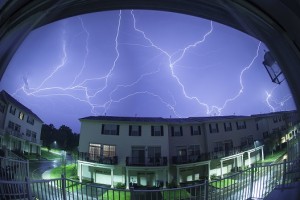 When you think motion detectors (or sensors) you might picture a heist scene from the movies where a thief has to perform acrobatics in order to avoid a web of alarm triggering laser-beams surrounding a priceless gem. While that narrative is not necessarily complete fiction, it’s not exactly how motion detection is implemented in the real world. In modern day applications security system integrators use motion detectors to sense unwarranted movement within or outside of a home or facility. Motion detectors are typically implemented as an essential part of a comprehensive security system meant to help detect an intruder. There are different types of detectors and their applications are not necessarily synonymous.
When you think motion detectors (or sensors) you might picture a heist scene from the movies where a thief has to perform acrobatics in order to avoid a web of alarm triggering laser-beams surrounding a priceless gem. While that narrative is not necessarily complete fiction, it’s not exactly how motion detection is implemented in the real world. In modern day applications security system integrators use motion detectors to sense unwarranted movement within or outside of a home or facility. Motion detectors are typically implemented as an essential part of a comprehensive security system meant to help detect an intruder. There are different types of detectors and their applications are not necessarily synonymous.
Our licensed team at Perfect Connections, Inc. has been protecting homes and businesses throughout northern and central New Jersey with comprehensive security systems for the past 23 years. We know one of the best ways to halt an intruder is immediate detection that triggers the alarm system. Motion detectors do just that. When they detect motion they communicate with the central alarm panel triggering an alarm, ultimately notifying your monitoring service of a disturbance; and before you know it help is on the way.
What are the different types of detectors? In general there are two types of motion detectors, passive and active. Within those two categories there are different detector technologies. Passive detectors sense energy changes within a specific boundary whereas active detectors emit energy to detect motion.
Passive infrared (PIR) is a common technology that detects heat. If there is disparity between the temperature of the protected area and an obstructive object (intruder) the sensors will be tripped and an alarm will be triggered. This technology is not immune to triggering false alarms especially if automatic temperature compensation is not employed. A PIR detector should have automatic temperature compensation to help stabilize the detector in variant temperature conditions.
Microwave (MW) is an active detector that emits microwave pulses and reads the reflection of a moving object. This type of detector can cover a larger area than a PIR but it can be susceptible to electrical interference. MW detectors do not recognize the boundaries of walls so they can trigger false alarms set off by random exterior motion.
Then there is Dual Technology detectors which employ a combination of active and passive sensors. This could mean the combination of PIR and MW technology. These types of detectors are less likely to set off false alarms as both types of sensors would have to be tripped in order for an alarm to be triggered. However, that doesn’t mean these detectors are infallible.
Prior to the creation of PIR and MW detectors, motion detectors were not held in the highest regards by system integrators and end-users alike due to their high false alarm rates. Before PIR and MW there was ultrasonics and photoelectric beams. Ultrasonic detectors would send out high frequency tones and then interpret the reflections for any disruptions. Photoelectric beams would send a light beam to a receiver that if interrupted would initiate the alarm sequence (picturing that heist scenario?). These types of detectors were particularly susceptible to unpredictable movements as they didn’t have the technology to discriminate accurately. While these motion detectors are not as widely used today they are by no means obsolete.
As technology progresses and the notion of wired installations becomes less and less appealing, wireless systems are taking off. It’s no different with motion detectors. Most can be installed wirelessly making their applications less laborious and diverse. Many security system components have been developed to include interior motion sensors as well, like surveillance equipment and access controls. For pet owners, there are motions detectors that can be setup to ignore regular motion from pets of a certain size. Proper installation is crucial to the effectiveness of a motion detector therefore it should be done by a licensed professional.
Comprehensive security systems are what protect your home and business from external and internal threats. It’s important to consider motion detectors as part of a comprehensive system. They provide a layer of security that can’t be duplicated, sensing an intruder at the first sign of a break-in. As licensed security system integrators, our team at Perfect Connections, Inc. has been providing comprehensive security solutions to businesses and homes throughout northern and central New Jersey since 1992. We help protect what is most important and give you a peace of mind you can’t get from anything else.
If you live or run a business in Central or Northern New Jersey and would like information on any of the topics discussed above, please call 800-369-3962 or simply CLICK HERE.
Image Credit: Image by CHG (Own work)-Google-Creative Commons
 In an unpredictable world, one thing is certain, we all want to protect what’s ours. Whether you’re a business owner or a homeowner, you want to keep safe that which you’ve worked so hard for. One of the most effective ways to do that is to install a security system. Well, what exactly is a security system and what makes it a system?
In an unpredictable world, one thing is certain, we all want to protect what’s ours. Whether you’re a business owner or a homeowner, you want to keep safe that which you’ve worked so hard for. One of the most effective ways to do that is to install a security system. Well, what exactly is a security system and what makes it a system?  As the technology driven world continues to evolve, our lives are becoming more and more connected. Virtual distances are shrinking. This has been happening since the inception of the internet. You no longer have to fly across the world to have a meeting, you simply login to a virtual meeting where you can talk “in-person” via video chat. Although it may be imperfect, technology has certainly had an impact on all of our lives in one way or another.
As the technology driven world continues to evolve, our lives are becoming more and more connected. Virtual distances are shrinking. This has been happening since the inception of the internet. You no longer have to fly across the world to have a meeting, you simply login to a virtual meeting where you can talk “in-person” via video chat. Although it may be imperfect, technology has certainly had an impact on all of our lives in one way or another. The days of struggling to carry 50 pounds of groceries while simultaneously trying to dig your house keys out of your pocket or purse, might be coming to an end. As a homeowner your door locks have always been an essential line of defense when it comes to protecting your home. While our everyday lives are saturated with technological advancement, it only makes sense that our physical structures should follow suit. That being said, using a key to unlock your doors may be a thing of the past with wireless access control on the rise.
The days of struggling to carry 50 pounds of groceries while simultaneously trying to dig your house keys out of your pocket or purse, might be coming to an end. As a homeowner your door locks have always been an essential line of defense when it comes to protecting your home. While our everyday lives are saturated with technological advancement, it only makes sense that our physical structures should follow suit. That being said, using a key to unlock your doors may be a thing of the past with wireless access control on the rise. So you’ve had home security system installed, everything is connected and ready to be armed. During the process did you sign up for an alarm monitoring service? If you didn’t, you’re missing a vital part of a truly comprehensive home security system. You could be leaving yourself open to risk regardless of your newly installed system. While having a security system will greatly lessen the risk of a break-in and provide you with a peace of mind, the caveat is what happens if you’re not home when the alarm goes off? Maybe you have a super vigilant neighbor that would hear the alarm or see a fire blazing, but you shouldn’t rely on that. At
So you’ve had home security system installed, everything is connected and ready to be armed. During the process did you sign up for an alarm monitoring service? If you didn’t, you’re missing a vital part of a truly comprehensive home security system. You could be leaving yourself open to risk regardless of your newly installed system. While having a security system will greatly lessen the risk of a break-in and provide you with a peace of mind, the caveat is what happens if you’re not home when the alarm goes off? Maybe you have a super vigilant neighbor that would hear the alarm or see a fire blazing, but you shouldn’t rely on that. At  When you’re a homeowner one of your top priorities is ensuring the safety of your home. Your home is what protects you and your family. Nobody wants to deal with a home break-in but they are a sad reality in our everyday lives. Fortunately there are many ways you can safeguard your home from such devastation. The best way to deter crime is to be prepared for it. If you want to prevent a home invasion you must first understand how and when burglars are likely to attempt them. At
When you’re a homeowner one of your top priorities is ensuring the safety of your home. Your home is what protects you and your family. Nobody wants to deal with a home break-in but they are a sad reality in our everyday lives. Fortunately there are many ways you can safeguard your home from such devastation. The best way to deter crime is to be prepared for it. If you want to prevent a home invasion you must first understand how and when burglars are likely to attempt them. At  How do you judge the value of a home? Is it the market price? Is it the neighborhood where it’s located? Or maybe it’s the aesthetics. Actually it’s all of the above and then some. If you’re a homeowner one sure fire way to add value to your home is by installing a comprehensive home security system. A home security system offers a peace of mind to homeowners they can’t get anywhere else, but that’s not all.
How do you judge the value of a home? Is it the market price? Is it the neighborhood where it’s located? Or maybe it’s the aesthetics. Actually it’s all of the above and then some. If you’re a homeowner one sure fire way to add value to your home is by installing a comprehensive home security system. A home security system offers a peace of mind to homeowners they can’t get anywhere else, but that’s not all. House fires. Nobody wants to think about them, but they are an unfortunate reality in our imperfect world. While a house fire can be unpredictable there are precautionary measures you can take to avoid them. Being prepared is half the battle, but knowing what to do in the event of a fire is equally important.
House fires. Nobody wants to think about them, but they are an unfortunate reality in our imperfect world. While a house fire can be unpredictable there are precautionary measures you can take to avoid them. Being prepared is half the battle, but knowing what to do in the event of a fire is equally important. We all know the weather is unpredictable no matter how many radars or meteorologists tell us otherwise. Mother Nature is impulsive and she strikes at will. A common and sometimes unpleasant result of severe weather is power outages. During a thunderstorm outages may last a couple of hours but extreme weather conditions have been known to leave civilians without power for weeks at a time. The
We all know the weather is unpredictable no matter how many radars or meteorologists tell us otherwise. Mother Nature is impulsive and she strikes at will. A common and sometimes unpleasant result of severe weather is power outages. During a thunderstorm outages may last a couple of hours but extreme weather conditions have been known to leave civilians without power for weeks at a time. The  What is it about our homes that make us feel safe? Is it the sound of our kids running up and down the stairs? Is it the personalized décor? Is it the smell? Maybe it’s the locks on our doors and windows or the surrounding neighborhood? Whatever it is, we all want that feeling to last, right? Of course we do. So what are you doing to maintain the safety and security of your home? There are many tips and tricks you can use to safeguard your home, one of the best defenses is a customized comprehensive security system. As a trusted security systems provider for the past 23 years, our team at
What is it about our homes that make us feel safe? Is it the sound of our kids running up and down the stairs? Is it the personalized décor? Is it the smell? Maybe it’s the locks on our doors and windows or the surrounding neighborhood? Whatever it is, we all want that feeling to last, right? Of course we do. So what are you doing to maintain the safety and security of your home? There are many tips and tricks you can use to safeguard your home, one of the best defenses is a customized comprehensive security system. As a trusted security systems provider for the past 23 years, our team at 